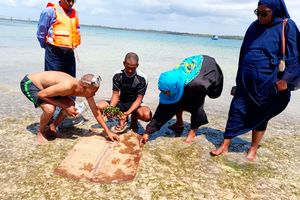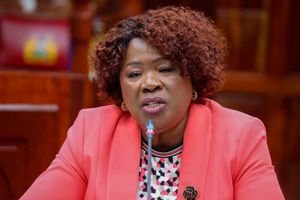New project to monitor, protect marine life through technology

Kenya Wildlife Service Coast Conservator Adan Kala during the launch of Tech4Nature, a groundbreaking initiative where technology will be used to protect Kisite Mpunguti Marine Reserve in Kwale County, on January 22 2025.
What you need to know:
- Kisite Mpunguti National Marine Reserve in Kwale County, which is renowned for its vibrant coral gardens, ornamental fish and playful dolphins, attracts thousands of tourists yearly.
An innovative project is set to transform conservation efforts at Kisite Mpunguti National Marine Reserve in Kwale County, helping to protect marine biodiversity under threat from climate change and human activities.
The reserve, renowned for its vibrant coral gardens, ornamental fish and playful dolphins, attracts thousands of tourists yearly.
However, its fragile ecosystem faces challenges such as rising ocean temperatures, pollution, illegal fishing and habitat degradation
To address these threats, the Kenya Wildlife Service (KWS), in partnership with the International Union for Conservation of Nature (IUCN) and tech giant Huawei, has launched the Tech4Nature project, where artificial intelligence (AI) and underwater cameras will be used to provide real-time data, enabling effective monitoring of marine activities in the Indian Ocean and timely responses to potential threats.
Key tourist attractions
According to KWS Senior Assistant Director Coast Conservation Area Adan Kala, the marine park faces various challenges that are a threat to marine animals and coral gardens - key tourist attractions.
He said the technology will help address the challenges that affect critical ocean features such as coral reefs, parrot fish, turtles and seagrass gardens underwater
“We have been having a challenge of accessing some parts of the marine park especially at night. But these underwater cameras will be deployed in such areas to help monitor the park. Illegal fishing using small nets has been rampant, endangering critical species like coral reefs, turtles, parrotfish, and seagrass gardens. With these underwater cameras, we can monitor such areas round the clock,” said Mr Kala
He noted that already, 40 per cent of Kenya’s corals have experienced bleaching due to high temperatures but that continuous data from the cameras and audio monitoring technologies will inform how best to protect the corals.
Speaking during the unveiling of the project at Shimoni in Kwale County, IUCN Country Representative Innocent Kabenga said technology will play an important role in conserving marine species and animals that have been listed as endangered.
“This is the first time Kenya is applying technology in marine conservation. The system will provide real-time insights into species behaviour, population, and distribution, while also identifying illegal activities such as fishing. This will greatly enhance conservation efforts,” said Mr Kabenga.
Artificial Intelligence will be trained to recognise specific target species such as turtles, by sight or sound, and provide real time data insights into the behaviour, population and distribution of these species in the marine reserve.
The system will also be able to identify boats used for illegal fishing and send alerts to rangers to intervene in real time.
Mr Kabenga added that this will also be an opportunity for the park to obtain a global certification dubbed ‘Green List’, which will be a key attraction for tourists who want to visit more sustainable areas.
Huawei Kenya’s Media Director Khadija Ahmed said the tech company was focused on using available technologies to solve emerging challenges in communities, especially related to climate change.
“Climate change and biodiversity loss are threatening the health of our planet and placing our future at risk. But advancement in technology is offering another lifeline to humanity because such innovations help mitigate some of the world’s pressing environmental problems,” said Ms Ahmed.
She explained that to enable the system to work effectively, the company will provide improved network connectivity covering the park and watch tower to enable rapid transmission of collected data to a server for analysis by AI.
Besides KWS, the project will also be implemented by Wildlife Research and Training Institute, where scientists will use the data to develop measures that will help protect organisms in the reserve.
Mr Kala said once successful, KWS will expand the technology to other Marine Protected Areas like Diani-Chale Marine Reserve, Mombasa Marine Park, Malindi Marine Park and Watamu Marine Park to ensure a universal impact.
This is besides community outreach to raise awareness about the impact of climate change in the coastal areas and why locals should be keen on marine ecosystems that are threatened, vulnerable or endangered.
Tourism stakeholders lauded the initiative, noting that preserving the park’s unique biodiversity will enhance the visitor experience while sustaining the livelihoods of thousands who depend on tourism in the Coast region. "Taking care of our resources is key because that means the thousands of locals and even hotel owners who depend on tourism will benefit. The county revenue will also be boosted,” said Kwale Tourism Executive Michael Mutua.
scece@ke.nationmedia.com





